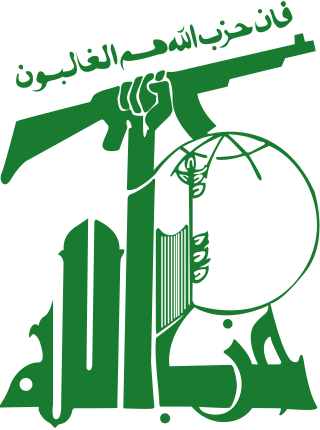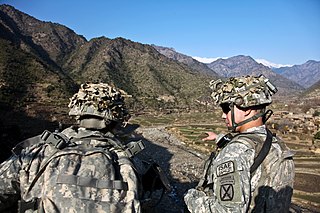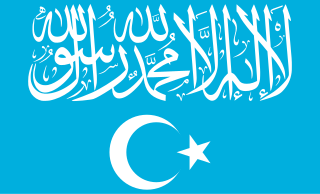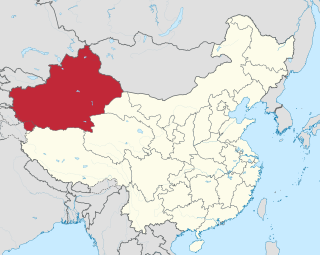
Al-Qaeda is a pan-Islamist militant organization led by Sunni Jihadists who self-identify as a vanguard spearheading a global Islamist revolution to unite the Muslim world under a supra-national Islamic caliphate. Its membership is mostly composed of Arabs, but also includes people from other ethnic groups. Al-Qaeda has mounted attacks on civilian, economic and military targets of the US and its allies; such as the 1998 US embassy bombings, the USS Cole bombing and the September 11 attacks. The organization is designated as a terrorist group by NATO, the UN Security Council, the European Union, and various countries around the world.

Hezbollah is a Lebanese Shia Islamist political party and militant group. Its paramilitary wing is the Jihad Council. Hezbollah was led by Secretary-General Hassan Nasrallah from 1992 until his assassination in an airstrike in Beirut in September 2024.

Operation Enduring Freedom (OEF) was the official name used by the U.S. government for both the first stage (2001–2014) of the War in Afghanistan (2001–2021) and the larger-scale Global War on Terrorism. On 7 October 2001, in response to the September 11 attacks, President George W. Bush announced that airstrikes against Al-Qaeda and the Taliban had begun in Afghanistan. Beyond the military actions in Afghanistan, Operation Enduring Freedom was also affiliated with counterterrorism operations in other countries, such as OEF-Philippines and OEF-Trans Sahara.

Ansar al-Islam in Kurdistan, simply called Ansar al-Islam, is a Kurdish Islamist militant and separatist group. It was established in northern Iraq around the Kurdistan Region by Kurdish Islamists who were former Taliban and former Al-Qaeda volunteers, which were coming back from Afghanistan in 2001 after the Fall of Kabul. Its motive is to establish an Islamic state around the Kurdistan region and to protect Kurdish people from other armed insurgent groups. It imposed strict Sharia in villages it controlled around Byara near the Iranian border.

The Turkistan Islamic Party (TIP) is a Uyghur Islamic extremist organization founded in Pakistan by Hasan Mahsum. Its stated goals are to establish an Islamic state in Xinjiang and Central Asia.
State-sponsored terrorism is terrorist violence carried out with the active support of national governments provided to violent non-state actors. States can sponsor terrorist groups in several ways, including but not limited to funding terrorist organizations, providing training, supplying weapons, providing other logistical and intelligence assistance, and hosting groups within their borders. Because of the pejorative nature of the word, the identification of particular examples are often subject to political dispute and different definitions of terrorism.

The Islamic Movement of Uzbekistan was a militant Islamist group formed in 1998 by Islamic ideologue Tahir Yuldashev and former Soviet paratrooper Juma Namangani; both ethnic Uzbeks from the Fergana Valley. Its original objective was to overthrow President Islam Karimov of Uzbekistan and create an Islamic state under Sharia; however, in subsequent years, it reinvented itself as an ally of Al-Qaeda. The group also maintained relations with Afghan Taliban in 1990s. However, later on, relations between the Afghan Taliban and the IMU started declining.

Jaish-e-Mohammed is a Pakistan-based Deobandi jihadist terrorist group active in Kashmir. The group's primary motive is to separate Kashmir from India and merge it into Pakistan.

The East Turkestan independence movement is a political movement that seeks the independence of East Turkestan, a large and sparsely-populated region in northwest China, as a nation state for the Uyghur people. The region is currently administered by the People's Republic of China (PRC) in the Xinjiang Uygur Autonomous Region (XUAR). Within the movement, there is widespread support for the region to be renamed, since "Xinjiang" is seen by independence activists as a colonial name. "East Turkestan" is the best-known proposed name as it is the historical geographic name of the region and the name of the two independent states that briefly existed in the region in the first half of the 20th century.

The East Turkestan Liberation Organization (ETLO) was a secessionist Uyghur organization that advocated for an independent Uyghur state named East Turkestan in the Western Chinese province known as Xinjiang. The organization was established in Turkey in late 1997 to fight against the Chinese government in Xinjiang, a territory of ethnic Uyghur majority.

Harkat-ul-Jihad-al-Islami is a Pakistani Islamist extremist, fundamentalist and terrorist organisation affiliated with Al-Qaeda and the Taliban.

Osbat al-Ansar or Asbat an-Ansar is a Sunni fundamentalist group established in the early 1990s, with a primary base of operations in the Palestinian camp of Ain al-Hilweh refugee camp near Sidon, which claims professing the Salafi form of Islam and the overthrow of the Lebanese-dominated secular government.

Hasan Mahsum, also known as Abu-Muhammad al-Turkestani and Ashan Sumut, was an Uyghur militant who was the leader of the Turkistan Islamic Party, an Islamic extremist group suspected of having ties with Al Qaeda. He was shot dead in a counter-terrorism operation on October 2, 2003 by the Pakistani Army.
Terrorism in China refers to the use of terrorism to cause a political or ideological change in the People's Republic of China. The definition of terrorism differs among scholars, between international and national bodies and across time and there is no legally binding definition internationally. In the cultural setting of China, the term is relatively new and ambiguous.
The threat of terrorism in Kazakhstan plays an increasingly important role in relations with the United States which in 2006 were at an all-time high. Kazakhstan has taken Uzbekistan's place as the favored partner in Central Asia for both Russia and the United States. Kazakhstan's counter-terrorism efforts resulted in the country's 94th ranking among 130 countries in the 2016 Global Terrorism Index published by the Institute of Economics and Peace. The higher the position on the ranking is, the bigger the impact of terrorism in the country. Kazakhstan's 94th place puts it in a group of countries with the lowest impact of terrorism.

The Islamic Jihad Union is a militant Islamist organization founded in 2002 as a splinter group of the Islamic Movement of Uzbekistan (IMU). Headquartered in North Waziristan, a mountainous region of northwest Pakistan, bordering Afghanistan, the group has been affiliated with both Al-Qaeda and the Taliban.

The World Uyghur Congress (WUC) is an international organization of exiled Uyghur groups that claims to "represent the collective interest of the Uyghur people" both inside and outside of the Xinjiang Uyghur Autonomous Region of the People's Republic of China. The World Uyghur Congress claims to be a nonviolent and peaceful movement that opposes what it considers to be the Chinese "occupation" of 'East Turkestan' and advocates rejection of totalitarianism, religious intolerance and terrorism as an instrument of policy. It has been called the "largest representative body of Uyghurs around the world" and uses more moderate methods of human rights advocacy to influence the Chinese government within the international community in contrast to more radical Uyghur organizations.

The Xinjiang conflict, also known as the East Turkistan conflict, Uyghur–Chinese conflict or Sino-East Turkistan conflict, is an ethnic geopolitical conflict in what is now China's far-northwest autonomous region of Xinjiang, also known as East Turkistan. It is centred around the Uyghurs, a Turkic ethnic group who constitute a plurality of the region's population.

The Taliban has ruled Afghanistan as the Islamic Emirate of Afghanistan since taking control by force in 2021, overthrowing the internationally recognized Islamic Republic of Afghanistan. The takeover was widely criticized by the international community, and no countries have extended de jure diplomatic recognition to the new regime, despite nominally maintaining relations with Afghanistan. The Taliban has campaigned for international recognition since the takeover. Several countries have vowed never to recognize the Islamic Emirate, and others have said they will do so only if human rights in the country are respected. Some countries have accredited Taliban diplomats at the chargé d'affaires level despite not recognizing the Islamic Emirate. In September 2023, the People's Republic of China became the first country to formally name a new ambassador to the country since the takeover, and in January 2024 recognized the Taliban's envoy to China; however, the PRC still does not formally recognize the Taliban as the legitimate government of Afghanistan. The United Arab Emirates also accepted a Taliban appointed diplomat as Afghanistan's new ambassador in August 2024.













